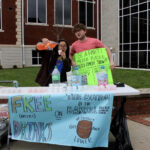On a foggy morning in Calabasas, California, a helicopter crashed and killed nine people on impact. The horrible tragedy became worldwide news when it was announced that Kobe Bryant and his 13-year old daughter Gianna were on board.
The awful weather conditions made it challenging for the pilot to navigate the chopper, and an article by Business Insider noted that “the helicopter missed clearing a hill by 20 to 30 feet and that it did not have a terrain warning system that could have alerted the pilot to the hills below him.”
When the news dropped, the world was in utter disbelief. Bryant was only 41, and the basketball world had pretty much immortalized him after his phenomenal career. The remainder of the day was a whirlwind of false reports, confusion, crying basketball players and iconic Bryant stories shared on social media.
Kobe Bryant was a household name, cementing his basketball legacy as one of the top ten, possibly top five basketball players of all time. He won five championships, two Olympic gold medals, had 18 All-Star appearances and was a 12-time All-Defensive Team selection.
Kobe was the Michael Jordan of the millennial and Gen Z generations. We all know Michael Jordan, but our interpretation of his greatness usually stems from the stories our parents have passed down to us. We grew up with Kobe. We witnessed his career firsthand.
His aggressive shooting as a player translated to our daily lives as we’d yell, “KOBE,” at the top of our lungs when we shot a paper ball into the trash can. Kobe was either basketball’s grandest hero or its most menacing villain during his playing days, but he was always in our minds either way.
He was a polarizing face in the league. Most of his opponents likely despised playing against him, knowing that there was no stopping him once he got going. And in 2003, his reputation came into question when he was accused of sexual assault. But in spite of the controversy, one common denominator remains: nearly everyone in the NBA respected him.
Bryant retired in 2016 and, afterward, spent most of his time with his wife Vanessa and his four daughters. He started coaching Gianna’s travel team, took her to several Lakers and WNBA games and became a major advocate of women’s basketball around the globe. He even won an Oscar for his animated short film, “Dear Basketball.” Kobe was an impressive person off the court. He could speak three languages and was a proficient storyteller. He was primed for a massive second act of life.
It might seem silly to some to shed tears and feel grief over a celebrity we didn’t know. While I understand that thinking, I also understand why Kobe feels like an outlier. We felt like we did know him. He’s been in the spotlight since the age of 17, and fans have watched him grow from a cocky young kid to a wise family man. We’ve witnessed his shortcomings, scandals, triumphs, rivalries and personal growth firsthand.
I will definitely miss seeing Kobe on my TV screen and following where his path led. I just pray this horrendous day reminds us to not waste our moments and live our days like they are our last. It’s what the Black Mamba would have wanted.








